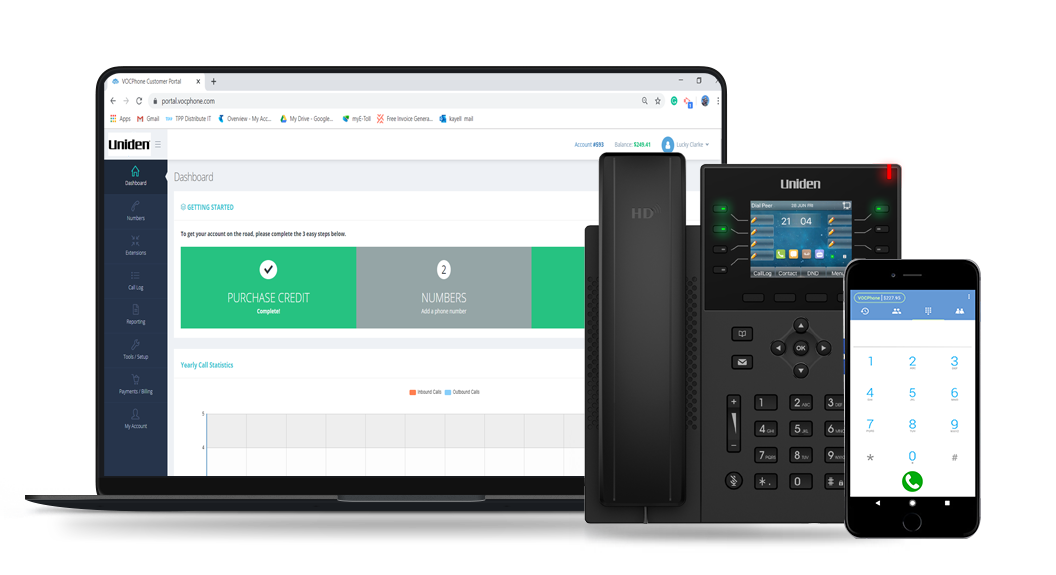
Discover how to choose the best Voice Over IP provider for Australian entrepreneurs
With many VoIP providers in the marketplace, it’s important to find the right option that suits your Australian business for improved communication.

With many VoIP providers in the marketplace, it’s important to find the right option that suits your Australian business for improved communication.
By 2026, it’s estimated that the global market for VoIP will grow to a staggering USD 102.5 billion. With a marketplace that’s already crowded—and will continue to get more crowded—Australian entrepreneurs need to find the right VoIP provider to gain a competitive edge.
With cloud-based phone systems offering a cost-effective and feature-heavy business communication solution, entrepreneurs need to choose wisely to get the best systems for the most impact.
In this quick guide, we give you the key factors you need to consider when choosing the right Voice Over IP provider and some common pitfalls that many Australian businesses fall victim to if they don’t choose wisely. By having a clear understanding of the options available, your business can deliver seamless communication for your team and your customers.

Every business wants uninterrupted call quality and a reliable connection that keeps you connected. This is why it’s important to assess a VoIP provider’s network infrastructure, redundancy measures, and quality of service (QoS) features for a more seamless call experience. From minimal dropped calls to high-quality voice communications, the right VoIP provider can make a world of difference for Australian entrepreneurs.
Don’t be distracted by a few good features that will add some value to your business communications. Consider the entire slate of features offered by your VoIP provider. Does the price you’re paying justify what you’re getting in return? Look for a full range of features that improve your collaboration, productivity, and customer service. From video conferencing to call recording, pick the provider that adds the most value.
VoIP is generally considered to be more cost-effective than traditional phone lines, but how much you save on your phone bills will depend on how well the pricing plan of the VoIP provider fits your budget and usage needs. Consider factors like monthly fees, call rates, and any other additional charges for advanced features or international calls. Keep a close eye on where your money is going and the value you’re getting.
With the increasing popularity of flexible work arrangements, Voice Over IP providers are uniquely placed to offer mobility features that allow teams to make and receive calls from anywhere in the world with a simple internet connection—with the help of mobile apps or a desktop. Make sure that the provider you choose can offer the robust mobile solutions you need especially in a background that is embracing flexible work.
Australian businesses make the common mistake of overlooking the quality of the call and how it impacts voice communications which can affect their entire business.
Whether your business scales up or down, it’s important to have a phone system that can reflect those changes instead of dealing with systems you no longer need.
Ignoring the potential risks and failing to ask about security or compliance measures of the system can lead to bigger problems down the road in case of a threat.
If you have existing systems that need to be integrated with your new phone system then don’t fail to ask about how your new VoIP provider can accommodate them.
Don’t overlook responsiveness because if the VoIP providers’ customer service doesn’t offer the right connectivity then you could face challenges in the future.
At Uniden, we understand that Australian entrepreneurs and businesses need innovative VoIP solutions to propel their businesses by ramping up scalability, seamless integration, and cost-effective communication tools.
Our team is ready to introduce you to a comprehensive range of VoIP services that are tailored to meet the communication needs of businesses of all sizes. Speak to us today and find out how we help you with a smooth transition to minimise communication gaps.

Work with the right partner and get access to Australia’s smartest cloud-based phone system.
Unlike traditional phone systems that rely on physical phone lines, VoIP technology uses the internet to transmit voice data. This eliminates the need for costly infrastructure and long-distance charges, making VoIP a more cost-effective solution. VoIP also offers more advanced features and greater flexibility compared to traditional phone systems.
Yes, modern VoIP systems are highly reliable when implemented with a robust internet connection and a reputable VoIP provider. Quality providers offer advanced features like call redundancy, failover mechanisms, and Quality of Service (QoS) prioritisation to ensure uninterrupted and high-quality voice communications.
Yes, reputable VoIP providers offer number porting services, allowing you to transfer your existing business phone numbers to the new VoIP system. This process enables you to maintain your established phone numbers, minimising disruption to your customers.
Look for VoIP providers that offer redundancy features, such as automatic failover to backup systems, geo-redundant data centres, and disaster recovery plans. Additionally, consider implementing redundant internet connections, uninterruptible power supplies (UPS), and mobile twinning capabilities to ensure continued operations during outages or emergencies.
On-premises VoIP solutions involve installing and managing the VoIP hardware and software infrastructure on-site, giving you complete control but requiring upfront investment and ongoing maintenance. Hosted (or cloud-based) VoIP solutions are delivered as a service by the provider, with the infrastructure hosted in their data centres. Hosted solutions offer greater flexibility, scalability, and reduced maintenance costs, but you rely on the provider's infrastructure and service level agreements.